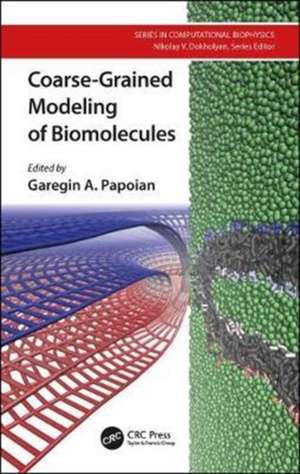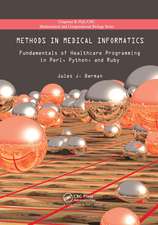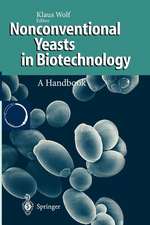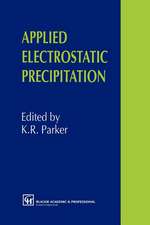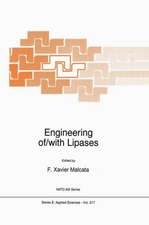Coarse-Grained Modeling of Biomolecules: Series in Computational Biophysics
Editat de Garegin A. Papoianen Limba Engleză Hardback – 30 oct 2017
This book highlights the state-of-art in coarse-grained modeling of biomolecules, covering both fundamentals as well as various cutting edge applications. Coarse-graining of biomolecules is an area of rapid advances, with numerous new force fields having appeared recently and significant progress made in developing a systematic theory of coarse-graining. The contents start with first fundamental principles based on physics, then survey specific state-of-art coarse-grained force fields of proteins and nucleic acids, and provide examples of exciting biological problems that are at large scale, and hence, only amenable to coarse-grained modeling.
- Introduces coarse-grained models of proteins and nucleic acids.
- Showcases applications such as genome packaging in nuclei and understanding ribosome dynamics
- Gives the physical foundations of coarse-graining
- Demonstrates use of models for large-scale assemblies in modern studies
| Toate formatele și edițiile | Preț | Express |
|---|---|---|
| Paperback (1) | 312.43 lei 43-57 zile | |
| CRC Press – 31 mar 2021 | 312.43 lei 43-57 zile | |
| Hardback (1) | 1049.90 lei 43-57 zile | |
| CRC Press – 30 oct 2017 | 1049.90 lei 43-57 zile |
Preț: 1049.90 lei
Preț vechi: 1446.23 lei
-27% Nou
Puncte Express: 1575
Preț estimativ în valută:
200.96€ • 218.36$ • 168.92£
200.96€ • 218.36$ • 168.92£
Carte tipărită la comandă
Livrare economică 21 aprilie-05 mai
Preluare comenzi: 021 569.72.76
Specificații
ISBN-13: 9781466576063
ISBN-10: 1466576065
Pagini: 458
Ilustrații: 103
Dimensiuni: 156 x 234 x 34 mm
Greutate: 0.86 kg
Ediția:1
Editura: CRC Press
Colecția CRC Press
Seria Series in Computational Biophysics
ISBN-10: 1466576065
Pagini: 458
Ilustrații: 103
Dimensiuni: 156 x 234 x 34 mm
Greutate: 0.86 kg
Ediția:1
Editura: CRC Press
Colecția CRC Press
Seria Series in Computational Biophysics
Cuprins
Inverse Monte Carlo Methods. Thermodynamically Consistent Coarse-Graining of Polymers. Microscopic Physics-Based Models of Proteins and Nucleic Acids: UNRES and NARES. AWSEM-MD: Predicting Protein Structure and Function. Elastic Models of Biomolecules. Knowledge-Based Models: RNA. The Need for Computational Speed: State of the Art in DNA Coarse Graining. Coarse-Grained Modeling of Nucleosomes and Chromatin. Modeling of Genomes. Mechanics of Viruses.
Notă biografică
Garegin A. Papoian is the first Monroe Martin Professor with appointments in the Department of Chemistry and Biochemistry and the Institute for Physical Science and Technology at the University of Maryland. He was born in Yerevan, Armenia, and completed four years of undergraduate studies in the Higher College of the Russian Academy of Sciences, followed by graduate work with Professor Roald Hoffmann at Cornell University. He received his Ph.D. in 1999, working on quantum chemistry of intermetallic alloys and heterogenous catalysis. He then joined the research group of Professor Michael Klein at the University of Pennsylvania as a postdoctoral associate in 2000, to study metallo-enzymes with Car-Parrinello simulations. This was followed by a National Institutes of Health sponsored postdoctoral fellowship with Professor Peter Wolynes at University of California, San Diego, from 2001-2004, with research focused on protein folding, binding, and hydration. He started his independent group in 2004 as an Assistant Professor of Chemistry at the University of North Carolina at Chapel Hill, where he received tenure in 2010. He subsequently moved to the University of Maryland into his current position. He is interested in bringing tools of physical chemistry to shed light on complex biological processes at the molecular and cell levels. His group is currently working on developing physico-chemical models of cytoskeletal dynamics and cell motility, modeling the way DNA packs in cells of higher organisms, and studying protein functional dynamics and allostery.
He is recipient of numerous awards, including: Phillip and Ruth Hettleman Prize for Artistic and Scholarly Achievement 2010; ACS Hewlett-Packard Outstanding Junior Faculty Award 2010; National Science Foundation CAREER Award 2009; Camille Dreyfus Teacher-Scholar 2008; Beckman Young Investigator 2007; Camille and Henry Dreyfus New Faculty Award 2004; and National Institutes of Health Postdoctoral Fellowship 2001.
He is recipient of numerous awards, including: Phillip and Ruth Hettleman Prize for Artistic and Scholarly Achievement 2010; ACS Hewlett-Packard Outstanding Junior Faculty Award 2010; National Science Foundation CAREER Award 2009; Camille Dreyfus Teacher-Scholar 2008; Beckman Young Investigator 2007; Camille and Henry Dreyfus New Faculty Award 2004; and National Institutes of Health Postdoctoral Fellowship 2001.
Recenzii
"The chapters in this book survey the progress in simulating biomolecular dynamics…. The images conjured up by this work are not yet universally loved, but are beginning to bring new insights into the study of biological structure and function. The future will decide whether this scientific movement can bring forth its Picasso or Modigliani."
–Peter G. Wolynes, Bullard-Welch Foundation Professor of Science, Rice University
–Peter G. Wolynes, Bullard-Welch Foundation Professor of Science, Rice University
Descriere
This book reflects on the tremendous impact of computational modeling, focusing on coarse-grained simulations for biomolecules, such as proteins and nucleic acids, for which systems may be too large and the processes too slow for atomistic or quantum simulations.
